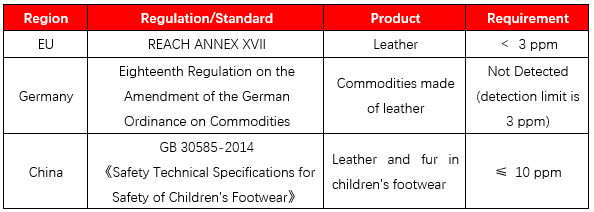
Recently, six California Proposition 65 (Prop 65) 60-day notices have been issued, alleging that some brands and retailers violate Prop 65 for selling leather gloves that contain hexavalent chromium (chromium VI) in California. The purpose of the notice is to initiate a lawsuit against the alleged violator.
Chromium VI have been listed on the Prop 65 list for carcinogenic and reproductive toxicity since1987. However, there is no settlement agreement on chromium VI for fashion items such as textiles, footwear and accessories ever before. The notice alleged that some of the leather gloves sold on the market contain chromium VI, but these products do not provide clear and reasonable warning, which violate Prop 65.
In this period, Chromium VI may become a target chemical of Prop 65 after bisphenol A, and related leather gloves and other leather products have also begun to attract attention. Usually, a 60-day notice leads to a settlement negotiation. Once a settlement is reached, the defendant is usually required to reformulate the product to comply with certain restrictions or provide a warning label.
Formation of ChromiumVI in leather
Over 80% of leather in global is tanned by chromium tanning agents. Chromium is the most versatile tanning agent, and it is one of the key factors that determine the softness, comfort, light resistance, shrinkage temperature and durability of leather. In general, chromium is used in +3 oxidation state, which is what we often call trivalent chromium (chromium III). However, under certain production and storage conditions, chromium III can be converted to chromium VI, which can easily trigger allergic reactions in human. At present, chromium VI in leatheris strictly controlled by many countries, and most of the recalls for leather products are related to chromium VI in EU.
Restrictions on Chromium VI of Leather in certain regions

About California Proposition 65
California Proposition 65, known as Prop 65, or, the ‘Safe Drinking Water and Toxic Enforcement Act of 1986’, was enacted in California in 1986. It is intended to protect California citizens and California drinking water resources from restricted chemicals and to reduce or eliminate exposures to those chemicals generally, such as consumer products, by requiring warnings in advance of those exposures. As part of the law, the state is required to publish a list of chemicals that are “known to the State of California to cause cancer or reproductive toxicity.” The list is updated at least once a year and now contains more than 900 substances.
Most businesses selling products in California must provide “clear and reasonable warnings”before knowingly exposing people to any chemical on the list, unless the expected level of exposure would pose no significant cancer risk. Prop 65 adopts safe harbor levels for many listed chemicals, and the safe harbor levelis completely different to the chemical total content of a product, so it cannot be used as a limit for testing directly. When an individual or group challenges the safety level of a listed chemical in a product and file a lawsuit, usually a settlement agreement or a judgment result will be reached. At present, enterprises manage the listed chemicals in products by referring to previous judgment or settlement of such products, and control certain chemical according to the limit requirement set in these cases.
CTT Advice
The 60-day noticeis a legal document issued by a private company to the manufacturer, which often leads to settlement negotiations. For each case of listed chemicals exposed, businesses making and selling products in California are liable to civil penalties of $2,500 per day. Moreover, the average cost per Prop 65 settlement is approximately $65,000. Therefore, manufacturers and retailers of leather gloves and leather products need to follow up the information of Prop 65 if they sell their products to California. Once the relevant settlement agreement or judgment case is generated, it is necessary to control the products according to reformulation requirement or provide warning label. CTT can help you manage the products in accordance to Prop 65, welcome to contact us.
